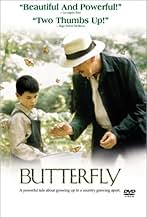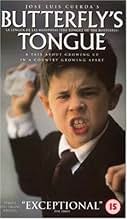ÉVALUATION IMDb
7,6/10
10 k
MA NOTE
Ajouter une intrigue dans votre langueSpain, 1936. Moncho is an outcast at school but is able to form a strong bond with his outspoken teacher. When fascism arrives to Spain, his teacher is considered an enemy of the regime.Spain, 1936. Moncho is an outcast at school but is able to form a strong bond with his outspoken teacher. When fascism arrives to Spain, his teacher is considered an enemy of the regime.Spain, 1936. Moncho is an outcast at school but is able to form a strong bond with his outspoken teacher. When fascism arrives to Spain, his teacher is considered an enemy of the regime.
- Director
- Writers
- Stars
- Prix
- 6 victoires et 19 nominations au total
Elena Bagutta
- Carmiña
- (as Elena Fernández)
Roberto Vidal Bolaño
- Boal
- (as Roberto Vidal)
Antonio Lagares
- Alcalde
- (as Tucho Lagares)
Avis en vedette
Adapted by screenwriter Rafael Azcona from three stories in Manuel Rivas novel "Que Me Quieres, Amor", Butterfly is a rare and insightful coming-of-age story that takes place in a rural part of northern Spain during the Second Republic when Spain had a brief flirtation with socialism and democracy. Against a background of the growing clouds of the Spanish Civil War, the film depicts the relationship between asthmatic 7-year old Moncho (Manuel Lozano) and his liberal schoolteacher played by the great Spanish actor Fernando Fernan Gomez (All About my Mother, The Grandfather).
Butterfly does not directly involve politics (at least until the end) but tells its story through snapshots of young Moncho, In the beginning, he is a quiet, shy boy who is afraid go to school because he thinks his teacher, Don Gregorio, will hit him. Gregorio, however, is a kind spirit who teaches his students to appreciate poetry, the beauty of nature, and the spirit of loving one another. Moncho grows from a frightened child to an enthusiastic young boy who is eager to learn all that he can about life. He divides his time between following his older brother's exploits playing the saxophone in a local band and chasing butterflies with his teacher friend. The butterfly here seems to be a symbol both of freedom and transformation.
I felt very involved with this young boy's world and found Lozano to be one of the most beguiling child actors that I have seen in a long time. His performance alone saves the film from Miramax-type sentimentality (which it occasionally drifts towards). Gomez is also wonderful as the compassionate teacher, symbolizing the humanitarian government that Spain enjoyed before the onset of fascism.
Eventually, Moncho must choose between his love for the teacher who opened his eyes to the beauty and wonder of the natural world and the ugly pressures of his family and neighbors to take sides in the political conflict. With the ending as shocking and memorable as Truffaut's The 400 Blows, Butterfly powerfully illuminates the human cost of war.
Butterfly does not directly involve politics (at least until the end) but tells its story through snapshots of young Moncho, In the beginning, he is a quiet, shy boy who is afraid go to school because he thinks his teacher, Don Gregorio, will hit him. Gregorio, however, is a kind spirit who teaches his students to appreciate poetry, the beauty of nature, and the spirit of loving one another. Moncho grows from a frightened child to an enthusiastic young boy who is eager to learn all that he can about life. He divides his time between following his older brother's exploits playing the saxophone in a local band and chasing butterflies with his teacher friend. The butterfly here seems to be a symbol both of freedom and transformation.
I felt very involved with this young boy's world and found Lozano to be one of the most beguiling child actors that I have seen in a long time. His performance alone saves the film from Miramax-type sentimentality (which it occasionally drifts towards). Gomez is also wonderful as the compassionate teacher, symbolizing the humanitarian government that Spain enjoyed before the onset of fascism.
Eventually, Moncho must choose between his love for the teacher who opened his eyes to the beauty and wonder of the natural world and the ugly pressures of his family and neighbors to take sides in the political conflict. With the ending as shocking and memorable as Truffaut's The 400 Blows, Butterfly powerfully illuminates the human cost of war.
In this film, we see Spain lurching toward the brink of the Spanish Civil War through the huge uncomprehending eyes of the child Moncho. The metaphor for "Butterfly" has many complex applications in this film but for me the most profound of them was the moment that Moncho's saintly teacher captures a butterfly in a net, tenderly observes it and then sets it free. If only the future of Spain had been in such sensitive hands. As the film progresses through its beautifully photographed scenes of ordinary life, the reality of the evils of Fascism and the hope of the Republicans begin to chasm the serenity of the land.
The film is not about war, it is rather, about how much personal honor people will trade for an idea of security for themselves and their families. In a way, it parallels the dilemma in the scene in Eisenstein's STRIKE in which a woman with starving children is thrown a coin by one of the factory bosses. Wonderfully executed performances in a profoundly moving film. -Rowena Silver
The film is not about war, it is rather, about how much personal honor people will trade for an idea of security for themselves and their families. In a way, it parallels the dilemma in the scene in Eisenstein's STRIKE in which a woman with starving children is thrown a coin by one of the factory bosses. Wonderfully executed performances in a profoundly moving film. -Rowena Silver
This was a film that really tugged at the heart strings. I really enjoyed the building of characters and the way the lives of the village were portrayed. It was a difficult time politically, yet the simplicity of daily life and family in Galicia was the over-riding story here. The acting is second to none and Manuel Lozano was unbelievably fantastic! I mean these ridiculous "affected" children they get for American movies (i.e. the "Pepsi" girl) are so unbelievable and fake. Manuel is so realistic as Moncho. So are the other actors.
I don't necessarily agree with the way that Cuerda rushed the ending, but I certainly wouldn't want to take away any time in portraying the lives of everyone involved. Maybe he should have made it a little longer as not to rush the ending. Although I will say that one of my favorite things about foreign films is that they are so NOT "Hollywood" that you never really know what to expect. Unlike the trite, unbelievable, over-acted, high budget American films and their overpaid actors which usually just leave a bad taste when I exit from the theatre.
This is an historical piece that absolutely shames "the Patriot". It's so nice to see that a movie doesn't have to change history to show us the past and entertain us at the same time!
I don't necessarily agree with the way that Cuerda rushed the ending, but I certainly wouldn't want to take away any time in portraying the lives of everyone involved. Maybe he should have made it a little longer as not to rush the ending. Although I will say that one of my favorite things about foreign films is that they are so NOT "Hollywood" that you never really know what to expect. Unlike the trite, unbelievable, over-acted, high budget American films and their overpaid actors which usually just leave a bad taste when I exit from the theatre.
This is an historical piece that absolutely shames "the Patriot". It's so nice to see that a movie doesn't have to change history to show us the past and entertain us at the same time!
This one was one of the excellent movies I have seen for the last couple of years. It takes you back to 1936, Spanish War in Galicia. Telling the truth I did not know well what happened there exactly . But this movie showed how the war influenced those people who lived in a small town to live their small lives. By the time they showed the ending scene my heart ached. I truly wished that someone could have been here with me to enjoy the afterglow this time. It has not happened to me lately. Plus their way to take this film was exquisite. Every single scene was beautiful and sentimental as if you turn around the post cards stand at the souvenir shop.
It's a beautiful (and too rare) thing to witness a child actor who can avoid the saccharine cutesiness so common to mainstream American child actors. In this film full of children there are, happily, no cloying, exaggerated "cute kid" moments.
The real beauty of La lengua de las mariposas is what's unspoken -- the truths that remain between the lines. The film's political theme is never heavy-handed, and its vivid and fascinating depiction of a turbulent moment in Spanish history has inspired in me a desire to learn more. Without spoiling the ending (which I read as fairly subversive, at least to an American audience), I must say I wasn't entirely surprised at what happened. It brought a tear to my eye and it's still making me think, three days later.
Those who liked this film should also see La Vita e Bella (Life Is Beautiful) and La notte di San Lorenzo (Night Of Shooting Stars), which are similar and may appeal equally, if not more.
The real beauty of La lengua de las mariposas is what's unspoken -- the truths that remain between the lines. The film's political theme is never heavy-handed, and its vivid and fascinating depiction of a turbulent moment in Spanish history has inspired in me a desire to learn more. Without spoiling the ending (which I read as fairly subversive, at least to an American audience), I must say I wasn't entirely surprised at what happened. It brought a tear to my eye and it's still making me think, three days later.
Those who liked this film should also see La Vita e Bella (Life Is Beautiful) and La notte di San Lorenzo (Night Of Shooting Stars), which are similar and may appeal equally, if not more.
Le saviez-vous
- AnecdotesThe original Spanish title of the movie is "La lengua de las mariposas" which is translated into English as "The Tongue of the Butterflies" though it could also be translated as "The Language of Butterflies" too. The right way is the first meaning, because at a point of the movie Don Gregorio talks his classroom about butterflies, explaining how they have a coiled proboscis used for sucking the flowers nectar.
- Bandes originalesEn er mundo
Written by Juan Quintero (as Juan Quintero Muñoz) and Jesús Fernández Lorenzo
Meilleurs choix
Connectez-vous pour évaluer et surveiller les recommandations personnalisées
- How long is Butterfly?Propulsé par Alexa
Détails
- Date de sortie
- Pays d’origine
- Site officiel
- Langues
- Aussi connu sous le nom de
- Butterfly
- Lieux de tournage
- sociétés de production
- Consultez plus de crédits d'entreprise sur IMDbPro
Box-office
- Brut – États-Unis et Canada
- 2 092 682 $ US
- Brut – à l'échelle mondiale
- 7 738 129 $ US
- Durée1 heure 36 minutes
- Couleur
- Mixage
- Rapport de forme
- 2.35 : 1
Contribuer à cette page
Suggérer une modification ou ajouter du contenu manquant

Lacune principale
By what name was La lengua de las mariposas (1999) officially released in India in English?
Répondre



























